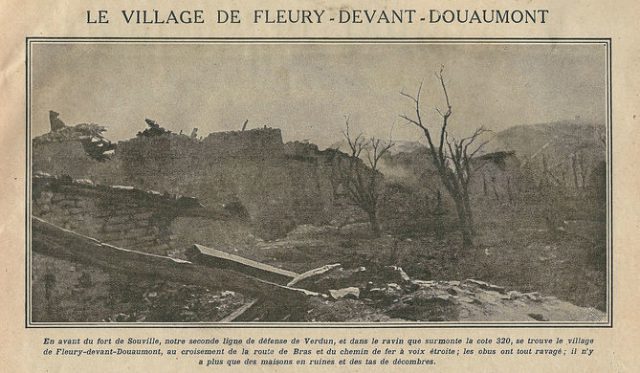From Atlas Obscura:
The unimaginable intensity of the shelling along the Western Front left swaths of agricultural land completely obliterated, churned up into a nightmarish landscape of craters and bodies. In the Battle of Verdun alone, which lasted for 303 days and remains one of the longest and most costly battles in human history, hundreds of thousands of men were killed.
Shortly after the war, the French government declared a 460-square-mile area unfit for human habitation or development. It stretches roughly from Nancy through Verdun and onto Lille, with various non-contiguous zones so riddled with unexploded shells (many of them gas shells), grenades, ammunition, and human and animal remains that it was simply too dangerous to enter. It was called the Zone Rouge.
Within the no-go zone are many ghost villages that were left abandoned after the war, deemed beyond repair. Signs around the zone warn “village detruit,” or destroyed village. It is said these towns “died for France.”
. . . .
[W]hile the controlled areas have shrunk since 1918, certain areas remain entirely off-limits, the soil so full of arsenic that 99 percent of all plants die, along with the ever-present threat of unexploded shells.
Link to the rest at Atlas Obscura
.
ZONE ROUGE – RED ZONE TRAILER 3 mn from cinephage! on Vimeo.

I don’t know nearly as much about WWI as I should, or would like to.
I have a decorative souvenir drinking glass that my German great-grandfather bought in a town he passed through as he walked home after the war. On the other side of the family and the war, I had a great-uncle who fought in the U.S. forces. He took up crocheting in his old age and I still have a pair of slippers (never worn) that he made. WWI is still in reach of living memory and had a profound influence on the world we live in today, but so little is said or taught about it any more. Even when I was in school in the 70s, I don’t remember being taught much about it.
The “Peace” that ended World War I included a great many flaws. One of the flaws was that the people of Germany, Austria-Hungary and some of their close allies felt the end of the war was determined by the negotiations at Versailles rather than the results on the battlefield. Germany and its cohorts did not believe they had truly been defeated by the Allied powers.
The fighting ended with an Armistice, a formal cease-fire, on November 11, 1918, but the peace treaty between Germany and the Allies was not signed until June 28, 1919. Similar delays characterized the conclusion of formal peace treaties between the Allies and other of the Central Powers.
The Versailles Treaty and corresponding peace treaties between the Western allies and other nations supporting Germany placed all the blame for the war on Germany and its allies and required them to make large reparation payments to the Allied nations.
Reparations were seen as a national humiliation by the Germans. Combined with the worldwide Great Depression, living conditions in Germany and Austria Hungary were very poor. Both nations experienced a financial collapse in the early 1930’s with their largest banks shutting their doors or sharply reducing the size of their businesses.
Hitler took political advantage of the German feelings that their leaders had betrayed them in the peace negotiations and had caused the financial disaster. When Hitler was elected Chancellor in 1933, one of his first acts was to cancel payments on loans taken out by Germany to fund reparation payments in the 1920’s.
Thus World War II began in Europe 20 years after Versailles between almost the same group of European nations that had fought in World War I. A great many of the senior and mid-level officers who fought in World War II had also fought in World War I.
World War II ended with the victors ousting the governments of the losers and occupying their nations so there was no question of the outcome of the war resting on a substantial military victory.
The seeds of the next big war are sown by the victory in the last one. We’re about due for the next Epochal War. And nowhere near ready.
Thank you for the explanation, PG. I knew some of that, but this added a lot to my understanding. The family lore is that my great-grandfather decided to bring his family to the U.S. in the mid-20s because he got tired of hauling a wheelbarrow full of mark notes down to the bakery to buy a loaf of bread. Conditions were ripe for political exploitation.